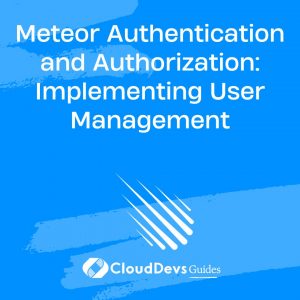Meteor Developer Hiring Guide
Meteor is a powerful and versatile JavaScript framework that has gained significant popularity among developers in 2023. Its real-time capabilities, integration features, comprehensive documentation, and vibrant community make it an attractive choice for developers looking to build scalable and real-time applications. Its advantages, such as its impressive performance, integration capabilities, and flexibility, make it an ideal choice for a wide range of development projects. Meteor’s flexibility also makes it an attractive choice for developers in 2023. It provides the necessary tools and libraries to support a variety of development approaches, including full-stack development, front-end development, and backend development. Developers can leverage Meteor’s versatility to build applications that are tailored to their specific needs and requirements. With the growing popularity of Meteor, the demand for Meteor developers too is growing.
Table of Contents
1. What is the popular development framework Meteor?
Meteor is a powerful open-source JavaScript framework. One of the key features of Meteor is its real-time capabilities. It enables developers to build applications that can instantly respond to user actions, without the need for manual synchronization.
- It incorporates popular JavaScript libraries, such as Angular, React, and Cordova, into its codebase, making it easy for developers to add functionalities to their applications. Furthermore, Meteor provides its own set of libraries and tools, enabling developers to build applications quickly and efficiently.
- It leverages the Node.js runtime environment, which enables it to handle concurrent requests efficiently. Meteor’s use of reactive programming also enables it to efficiently update UI elements based on the changes in the underlying data, leading to a smoother user experience.
- The framework allows for seamless communication between client-side and server-side code, eliminating the need for complex backend architecture. This integration allows for faster development and easier maintenance, as developers can modify both frontend and backend code simultaneously.
- It provides a variety of tools and libraries that enable developers to build applications with different functionalities. Whether it’s a social networking application, an e-commerce platform, or a data-driven dashboard, Meteor provides the foundations for developers to build robust and versatile applications.
- The framework is designed to be approachable and easy to learn, even for developers who are not familiar with JavaScript frameworks.
2. Benefits to companies from hiring Meteor developers in 2023
- Rapid Development: Meteor developers are skilled in using the Meteor JavaScript framework, which enables them to build applications quickly. With Meteor’s simplified coding structure and real-time updates, organizations can achieve faster development cycles and launch their products or services to market faster.
- Efficiency and Productivity: Meteor’s full-stack capabilities allow developers to work on both the client and server sides of an application, eliminating the need for separate teams or technologies. This streamlines the development process and improves efficiency and productivity within the organization.
- Real-time Updates: Meteor’s built-in reactivity feature enables real-time updates, making it easier for developers to create dynamic and interactive applications. Organizations can enhance user experience by providing instant updates and notifications, resulting in increased user engagement and satisfaction.
- Cross-platform Compatibility: Meteor supports cross-platform development, allowing developers to build applications that work seamlessly across various devices and operating systems. This flexibility reduces the need for separate development efforts and saves time and resources for organizations.
- Extensive Package Ecosystem: Meteor has a vast collection of packages and libraries available in its ecosystem, making it easier for developers to add functionalities to their applications. Organizations can leverage these pre-built components to accelerate development and enhance the capabilities of their applications.
- Scalability: Meteor is designed for scalability, allowing applications to handle increasing amounts of data and users without sacrificing performance. Hiring Meteor developers ensures that organizations can build scalable applications that can accommodate future growth and handle high traffic loads.
- Collaboration and Code Sharing: Meteor promotes collaborative development by providing tools for code sharing and real-time collaboration. This fosters better teamwork among developers, accelerates development cycles, and ensures consistent code quality throughout the organization.
- Cost-effectiveness: Hiring Meteor developers can be cost-effective for organizations. With its rapid development capabilities, cross-platform compatibility, and community-driven ecosystem, organizations can save time and resources in the development process, resulting in cost savings.
3. What do companies need to do when planning to hire Meteor developers?
Hiring the right Meteor developer can be a challenging task, but it is essential to ensure that the project runs smoothly and meets all expectations. Here are some key considerations for companies when preparing to hire Meteor developers.
- Specifying the project scope: First and foremost, companies need to specify the project scope, including the goals, objectives, and timelines. This will help to determine the required skillset and experience level of the Meteor developer. It will also enable the company to set clear expectations for the project and ensure that the developer is the right fit for the job.
- Development requirements: Companies also need to understand the development requirements, including the programming languages, frameworks, and tools required for the project. This will help to assess the developer’s knowledge and expertise in these areas. It is also important to evaluate the developer’s communication skills and ability to work collaboratively with the team.
- Project budget and risks: This includes evaluating the developer’s rates and fees, as well as assessing the potential risks associated with the project. The developer should be able to provide a clear understanding of the potential risks and provide recommendations to mitigate them.
- Candidate’s prior work portfolio: This includes reviewing their past projects, client testimonials, and references. It is also important to assess the developer’s ability to work with similar projects and their experience with similar industries.
4. Meteor developer roles and responsibilities
4.1 Frontend Development
- One of the key responsibilities of Meteor developers is to develop visually appealing and interactive user interfaces.
- They work closely with designers and UX experts to create user-friendly interfaces that enhance the user experience.
- Meteor developers are responsible for implementing JavaScript libraries and frameworks such as React, Angular, or Vue.js to build responsive and scalable frontend applications.
4.2 Backend Development
- In addition to frontend development, Meteor developers are also responsible for building robust backend architecture for Meteor applications.
- They work closely with backend developers to design and implement RESTful APIs that communicate with the frontend layer.
- Meteor developers also integrate applications with various databases such as MongoDB, PostgreSQL, or MySQL to store and retrieve data efficiently.
4.3 DevOps
- Meteor developers also play a crucial role in DevOps for Meteor applications.
- They are responsible for automating the deployment process, ensuring that the application is deployed smoothly and securely.
- Meteor developers also monitor the performance of the application, identify bottlenecks, and tune the application for optimal performance.
5. Tools and libraries for Meteor development
Meteor development requires a variety of tools and libraries to efficiently build, test, and debug applications. This document aims to provide a comprehensive overview of the various tools and libraries available for Meteor developers.
5.1 IDEs and Code Editors
An IDE (Integrated Development Environment) or code editor is an essential tool for any Meteor developer. It provides a user-friendly interface for coding, debugging, and managing project files. Some recommended IDEs and code editors for Meteor development include:
- Visual Studio Code: A popular and free code editor developed by Microsoft, Visual Studio Code provides a wide range of features and extensions specifically for Meteor development. It supports syntax highlighting, code linting, and autocompletion for Meteor-specific syntax.
- WebStorm: Another powerful IDE, WebStorm is known for its advanced code completion, code analysis, and refactoring features. It offers excellent support for Meteor development, including built-in Meteor templates and debuggers.
- Atom: A lightweight and customizable code editor, Atom is a popular choice among developers working on Meteor applications. It comes with built-in support for Meteor, including syntax highlighting, code autocompletion, and package management through the meteor package manager.
5.2 Package Managers
Package managers play a crucial role in Meteor development by facilitating the installation and updating of third-party libraries and packages. Popular package managers for Meteor development include:
- Meteor Package Manager: The default package manager for Meteor, the Meteor Package Manager (MPM) allows you to easily install and manage packages in your Meteor application. It uses npm under the hood, making it compatible with npm packages.
- Meteor Deps: An alternative package manager for Meteor, Meteor Deps offers a simpler and more intuitive interface for managing dependencies. It allows you to add, update, and remove dependencies with a single command.
5.3 Testing Tools
Testing is an essential part of the development process, particularly for Meteor applications. It helps in identifying bugs, ensuring code quality, and providing a stable user experience. Some of the popular testing tools for Meteor development include:
- Jasmine: A JavaScript testing framework, Jasmine is a popular choice for unit testing Meteor applications. It provides a simple and elegant syntax for writing tests, as well as BDD-style assertions and mocking capabilities.
- Mocha: Another popular testing framework for JavaScript, Mocha offers features like test discovery, assertion libraries, and asynchronous testing support. It is particularly suitable for testing Meteor applications because of its compatibility with Node.js.
- Sinon: A library for unit and integration testing, Sinon provides extensive support for mocking, stubbing, and spying on JavaScript objects. It enables you to create mock implementations of external dependencies, making it easier to test Meteor applications.
5.4 Debugging Tools
Debugging tools are essential for identifying and resolving bugs in your Meteor applications. They provide a mechanism for inspecting runtime state, stepping through code, and examining variables. Popular debugging tools for Meteor development include:
- Chrome Debugging Tools: The Chrome Developer Tools provide a powerful and feature-rich debugging environment for web applications, including Meteor applications. It offers features like real-time DOM inspection, network monitoring, and JavaScript debugging.
- Meteor Debugging Bundle: A browser extension for Google Chrome, the Meteor Debugging Bundle adds additional debugging capabilities to the Chrome Developer Tools. It provides features such as hot-reloading, breakpoints, and built-in debuggers for Meteor packages.
- Meteor Dev Tools: A standalone debugging tool for Meteor development, Meteor Dev Tools offers a powerful debugger with features like step-by-step execution, breakpoints, and code profiling. It is available as a browser extension for Chrome and Firefox.
Meteor development thereby offers a wide range of tools and libraries to facilitate efficient and effective development. Choosing the right tools and libraries can greatly enhance your productivity and the quality of your applications. By understanding the available options and choosing the ones that suit your development needs, you can maximize the benefits of Meteor development.
6. Evaluating candidates to land a best-fit Meteor developer for your project
6.1 Technical skills
- Firstly, assessing candidates’ proficiency in Meteor-specific concepts and frameworks is essential. This can be done through technical assessments or coding exercises that test their understanding of Meteor principles, such as real-time data synchronization and reactive programming.
- Organizations should evaluate candidates’ familiarity with relevant programming languages, such as JavaScript and MongoDB. A solid understanding of these languages is crucial for Meteor developers to effectively build and maintain applications.
- Assessing candidates’ experience with common tools and libraries used in Meteor development, such as Blaze and React, can also provide valuable insights into their technical expertise.
6.2 Soft skills
- Meteor developers often work in collaborative environments, so assessing candidates’ communication and teamwork abilities is essential.
- This can be done through behavioral interviews or scenario-based assessments that gauge candidates’ ability to work effectively with teammates, communicate complex ideas, and adapt to changing project requirements.
- Organizations should assess candidates’ problem-solving and critical-thinking skills. Assessing candidates’ problem-solving skills through coding challenges or case studies can provide valuable insights into their aptitude for addressing real-world development issues.
6.3 Fit with the company culture
- Organizations should consider their values, mission, and work environment to ensure a harmonious fit.
- Assessing candidates’ alignment with the company’s core values, as well as their willingness to learn and adapt, can be done through behavioral interviews and reference checks.
7. Where can expert Meteor developers be sourced from?
- Online recruitment platforms: These platforms allow companies to post job listings specifically tailored to their requirements. Some well-known online recruitment platforms that cater to hiring Meteor developers include LinkedIn, Indeed, and Glassdoor.
- Freelance platforms: These platforms connect businesses with independent professionals who specialize in Meteor development. Freelance platforms like Upwork, Freelancer, and Toptal are popular choices for finding Meteor developers on a project basis.
- Conferences and hackathons: These events bring together developers, including those skilled in Meteor, who are eager to showcase their expertise and network with potential employers or clients. Conferences like Meteor Devshop and Meteor Night provide opportunities to meet and connect with experienced Meteor developers. Hackathons, on the other hand, offer a more hands-on experience where developers work together to create innovative projects within a limited timeframe.
8. Average hourly rates of hiring Meteor developers
Hourly rates for Meteor developers can be influenced by several factors, including geographic location, level of experience, demand for Meteor developers, and whether the developer is hired remotely or as a full-time in-house employee.
Geographic location plays a significant role in determining hourly rates for Meteor developers, as presented in the table below. Developers based in large cities or areas with a high demand for skilled developers may charge more than those in smaller towns or areas with less demand. For example, a Meteor developer working from a developed country may charge more per hour than a developer working from a less developed region.
The level of experience of a Meteor developer can also affect their hourly rate. Developers with more experience and a proven track record may charge more than those just starting in their careers. This is due to the fact that experienced developers may be able to complete projects more efficiently and effectively, leading to a higher quality of work.
The demand for Meteor developers also plays a role in determining hourly rates. In areas where there is a high demand for skilled developers, rates may be higher due to the scarcity of talent. Conversely, in areas with lower demand, hourly rates may be lower.
Finally, whether a developer is hired remotely or as a full-time in-house employee can also affect their hourly rate. Remote developers may charge more due to the flexibility and convenience of working from home, while in-house employees may charge less due to the stability and security of a full-time position.
We at CloudDevs strive to provide you with a seamless hiring process that will help you hire the perfect Meteor developer. The above hiring procedures can be time-consuming or error-prone, hence you could invest your time elsewhere while our remote tech hiring platform will ensure you have the best possible hiring experience.
Choosing pre-vetted Meteor developers tailored to your needs has never been easier with CloudDevs! Reach out today!
Table of Contents








